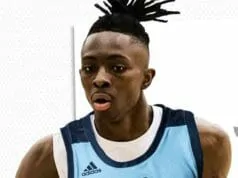
On Monday, May 25th, Memorial Day, I was “off the grid” for most of the day; not connected to social media or the news.
So when I began scrolling through my feed to catch-up on Tuesday morning, my timeline was flooded with headlines about both George Floyd and Amy Cooper.
My most immediate reaction was sadness, something like “not again!”
My job is to cover college basketball recruiting. Part of that is having a presence on social media. But tweeting about recruiting or basketball just seemed irrelevant that day, disrespectful even.
I spent most of the next 48 hours reading and thinking. Reading the posts and stories I saw on social media and thinking about what I could do.
What I didn’t want to do was to post something to show everyone how “woke” I am, as if I had checked the obligatory box but was going right back to my normal week. I wanted to try to contribute in some small way, whatever way I could.
Unfortunately, George Floyd’s story is not unique, but just the latest in a long line of tragic, unjust deaths for black men in this country. But the impact his death has had on our country is unique. Maybe it’s because of the pause that COVID-19 has brought or maybe it is the straw that broke the camel’s back, but we’ve now seen and heard masses say “enough is enough.”
We’ve also seen the masses start to educate themselves. I’d had a bit of a head start. Race had been an issue that I’d begun to explore more deeply a few months prior.
I had always considered myself one of the good guys. I didn’t have a racist bone in my body, had stood up against racism on a number of occasions, and had a number of friends of color, some of whom I taught my kids to call “uncle” and “auntie.”
It had only been in recent months though that I had engaged those friends in conversations about race. Too often, earlier, it was the thing we’d never talked about, partially because I’d thought it might be uncomfortable, but also because I, naively, didn’t think we’d needed to. I was sure they knew who I was and what they could expect from me.
That was narrow-minded and self-centered though.
I hadn’t asked them enough questions about their experiences, thoughts, and fears. I didn’t know enough about who they were.
Well that started to change over the winter. We had more conversations, real conversations, honest conversations. Sometimes they’d started around Colin Kaepernick and sometimes they’d started around how we internalized something I might have viewed as totally unrelated, like a donut shop.
One of my friends asked me to read a book, “We Were Eight Years in Power” by Ta-Nehisi Coates. I ordered it later that night and dove in. When I was done, I continued to explore that subject matter via various articles, podcasts, and conversations.
This education, or at least an introduction to one, made me that much more compelled to try to use whatever platform I have to further the conversation. I had learned so much that I didn’t know in the months prior. Things that I should have learned in school, but didn’t. Things that other people, especially people who look like me, should know. It wasn’t just theory, but tangible and recent history that made the reality of systemic racism that much more undeniable.
So on that Tuesday, I didn’t tweet. I called friends and colleagues, many of them in the black coaches’ community, looking for ways I could help and learn. What I was most surprised at in these initial conversations, was the price of speaking out. Coaches were leery and even warned me of it.
“Are you sure you want to do this?”
“Understand, you’re going to get criticized, no matter what you do.”
These were some of the warnings my friends, friends of color, offered me before we launched a series of episodes on “The Upside” dealing with these issues in our country and how they extend to the world of sport, and college basketball.
Simultaneously, I began to post on social media. I did my job and covered the major recruiting news, but also made it clear to friends, readers, and viewers, what they could expect from me. I wasn’t going to “stick to sports” but would do whatever I could to use the world of sports in which I live to help add, as best I could, to the conversation and, hopefully, the learning.
That led me to Dr. Scott Brooks, the director of research at the Global Sports Institute at Arizona State. We had never met, but had some mutual friends. I reached out by text on Thursday afternoon. He got right back to me and we recorded Saturday morning. That episode provided a good introduction to the series because it provided some academic context and a macro viewpoint of the issues before we dove into some of the micro experiences from specific members of the basketball community.
https://soundcloud.com/theupsidepodcast/dr-scott-brooks
One of the first questions I asked my friends in the black coaches’ community is ‘who are the leaders’ today. I would reference the likes of John Thompson, Nolan Richardson, and John Chaney and ask for this generation’s equivalent. The two names I kept hearing were Mizzou head coach Cuonzo Martin and Pittsburgh head coach Jeff Capel.
Coach Martin’s story was a compelling one. Not just because he came from humble beginnings and overcame great personal adversity (multiple knee injuries and a battle with cancer), but also because he came back to Mizzou when racial tensions were at their peak. To add perspective, not only was he having success as the head coach at Cal Berkeley, but he and his family were enjoying life in a very progressive area.
Conversely, the state of Missouri was a mess following the death of Michael Brown in Ferguson and subsequent riots. Mizzou itself had numerous issues with racism that led to both the president and the chancellor leaving the university. These are the challenges that Martin embraced by coming back home and that’s why his example is such an important one.
https://soundcloud.com/theupsidepodcast/missouri-coach-cuonzo-martin
As the week went on and I continued to work on this, one thing I couldn’t help noticing was the silence of many people in the basketball community, especially white people (the statements started flowing the following week as riots around the country intensified, but, in many cases, that was a week or more after George Floyd and Amy Cooper).
Marquette head coach Steve Wojciechowski certainly wasn’t the only exception, but he was one of the first I saw. His Instagram post was a heartfelt one too as he talked about his love for his players, the majority of whom are black, and how they set an example for his own sons.
He and Capel are close friends who both played and coached together at Duke. When I pitched the idea of them coming on together to talk about how they’ve discussed race over the years, experienced identical events from different perspectives, and approached leading their team, they were both all in. The episode ended up being one of the most powerful ones we’ve ever recorded.
https://soundcloud.com/theupsidepodcast/pitt-coach-jeff-capel-and-marquette-coach-steve-wojciechowski
We’re now three weeks removed from that Tuesday morning. We’ve tried to use the podcast as a platform to add to the conversation, promote learning and empathy as best we can. The conversations weren’t always comfortable. I was clumsy at times and rigid in other moments as I tried to ask the right questions and word them appropriately.
Realistically, I know the impact of these episodes has been miniscule in the long-run, but I also know I have learned some things. My hope is that there are some listeners out there who have too.
What comes now is the big question, and it’s one that even the NBA is wrestling with as they weigh the relationship of potentially returning to play while continuing to contribute to social justice.
For me, and this podcast, not every episode is going to focus exclusively on this topic indefinitely, but we may not be done just yet either.
Whenever the time comes that we do move on to different topics, I think it’s important that we do so with a holistic approach. The basketball world, much like our country, doesn’t exist without people of color and our conversations, both privately and publicly, need to reflect that.
Because, to quote Angela Davis, “it is not enough to be quietly non-racist, now is the time to be vocally anti-racist.”







